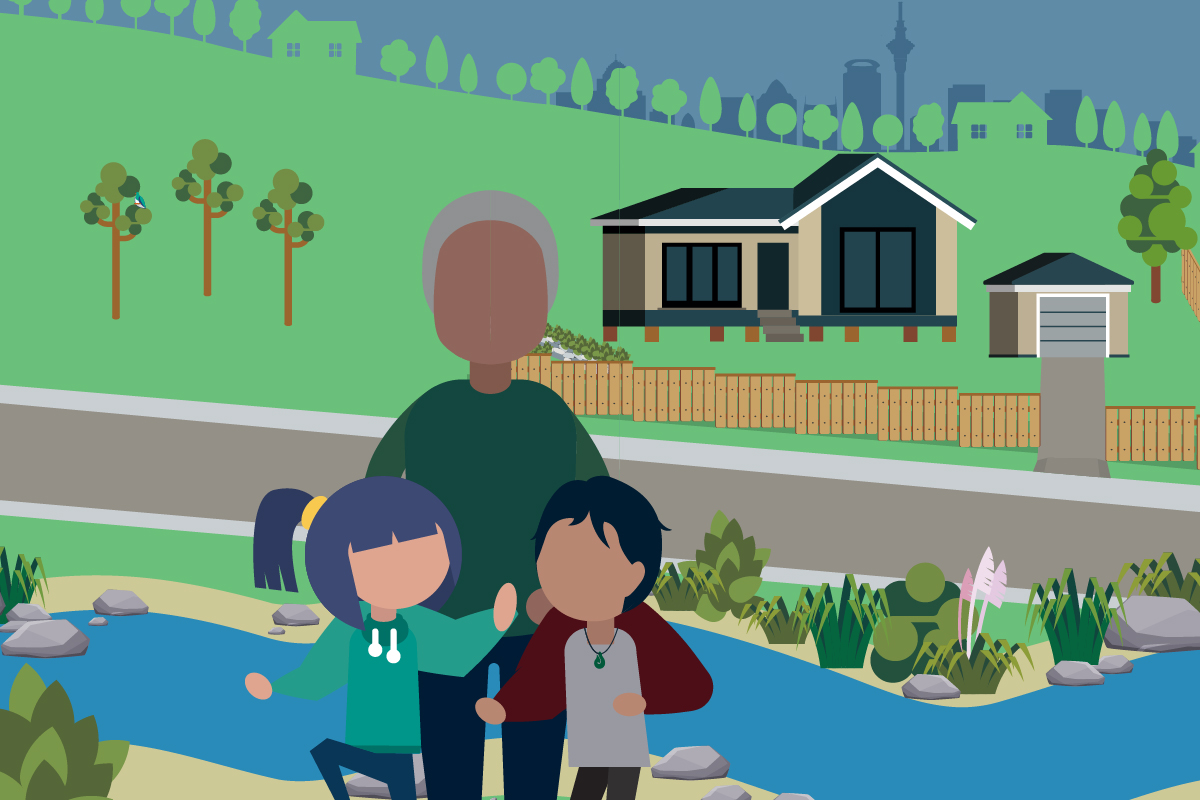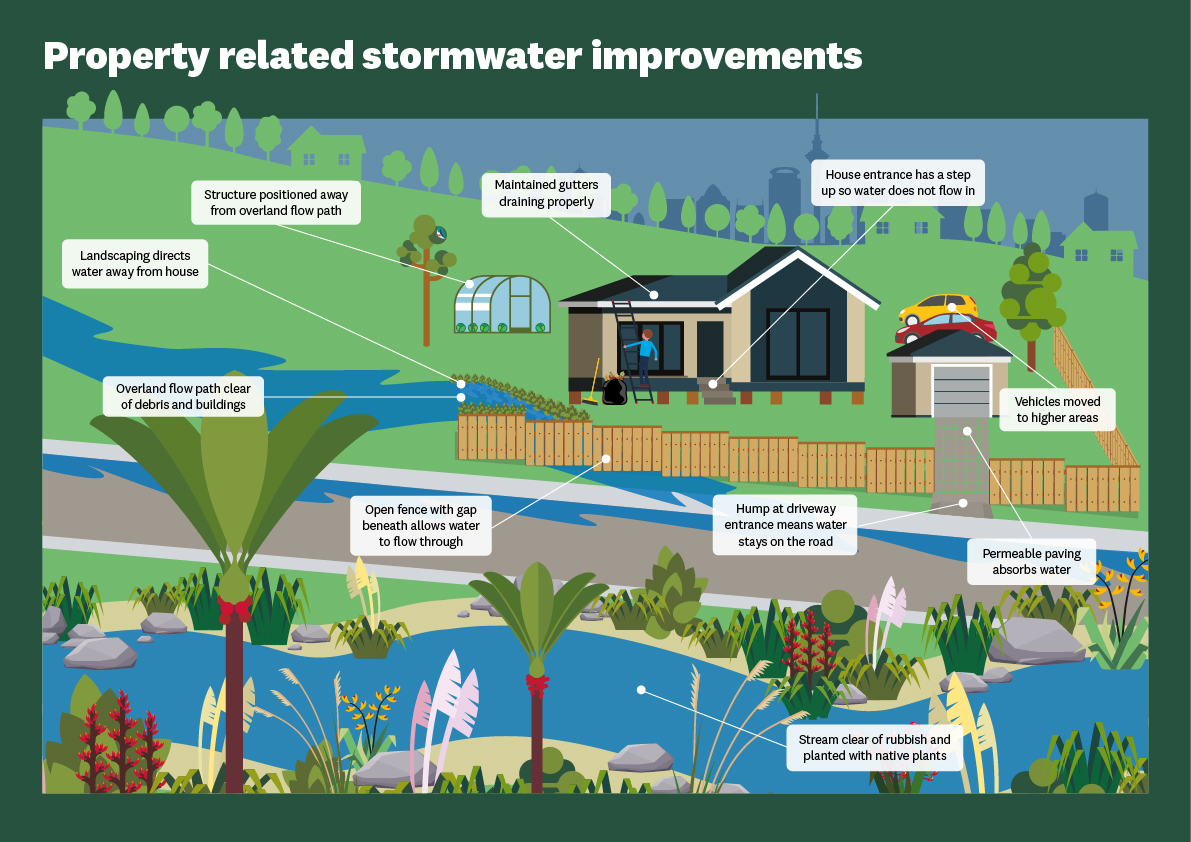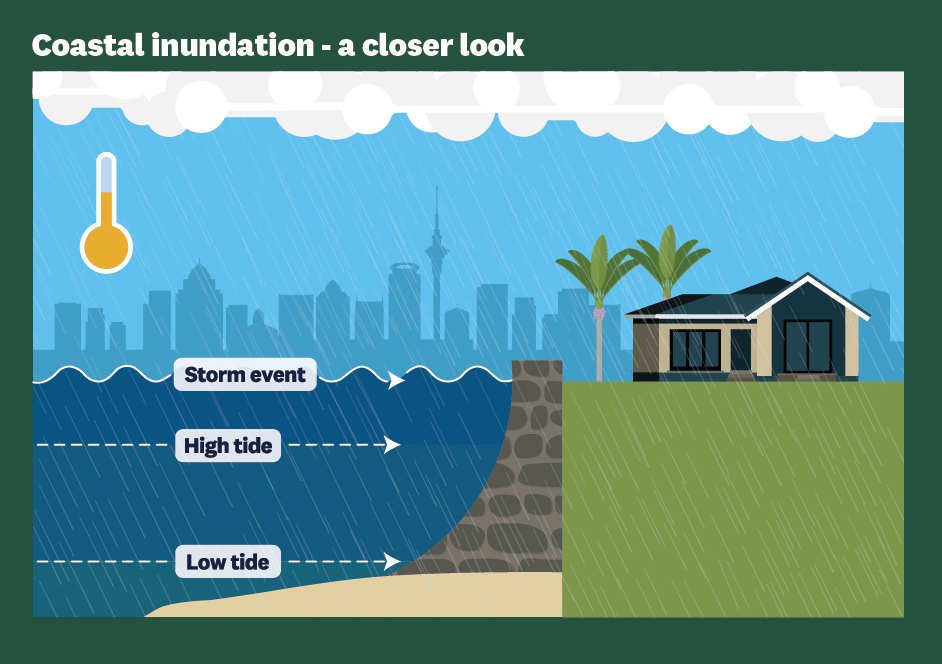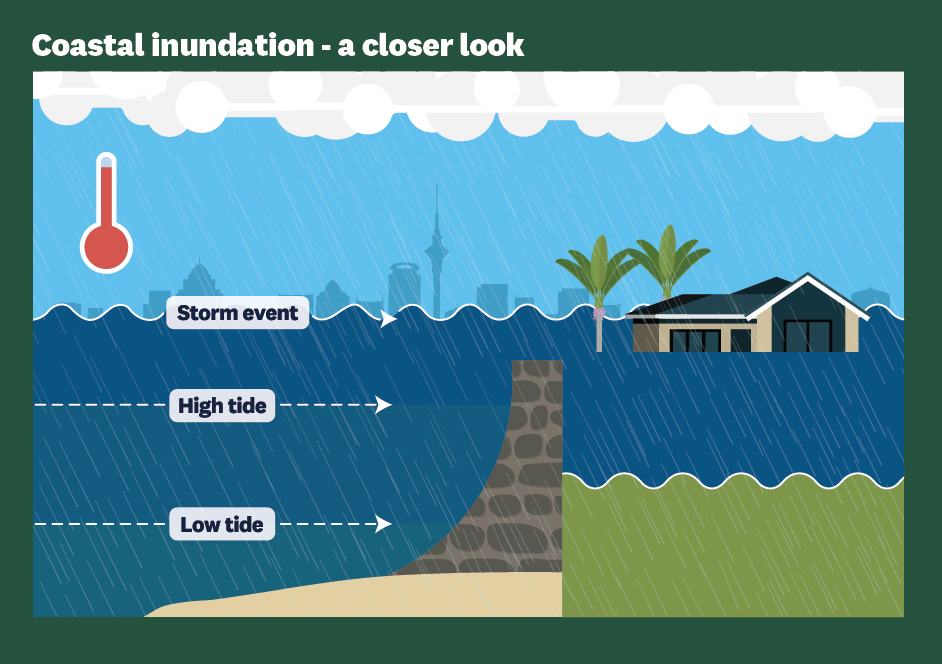- Make a household plan and be sure to include your pets.
- Follow Auckland Emergency Management on Facebook or X (formerly Twitter) to stay up to date with information about emergency situations.
- Help friends and family outside your household to prepare their own emergency plan, if they need assistance.
Before a natural hazard event
Develop a solid emergency plan
Food security
Know where to find food during an emergency. Try to have some items in your pantry that don’t need to be cooked (canned food is good), even if you buy a little extra each week to slowly build stock and include food for any pets in this planning.
Power
- Ensure you have a way to stay connected if there is no power, e.g. solar or wind-up charger for mobile phones.
- Invest in a classic, battery-powered transistor radio and make sure everyone in your household knows where the radio is kept as well as torches and spare batteries.
- Further information on how to cope during a power cut is here.
- For longer-term resilience, consider solar panels and batteries or a generator (your own or shared with others).
Supplies
Have a grab bag ready for everyone in your household in case you need to evacuate during an emergency. Some suggestions for this bag include:
- Warm clothes
- A bottle of water and snacks
- Copies of important documents (e.g. passports, birth certificates, pet information)
- Any medications you or anyone in your family (or your pets) may need.
Transport
Public transport may not be running, and many roads could be unusable.
- As a household, decide on a secondary meeting place such as a school family or friend’s house and ensure that everyone knows what to do.
- Consider alternative transport like cycling (though only do this in the cooler parts of the day if there is a heatwave).
Water
Be prepared to be without water. Some ways to prepare are by storing water (at least nine litres per person for three days). You can also think about ways to harvest rainwater and make it safe to drink. Collecting rainwater by installing a rainwater tank can help prepare for droughts and reduces excess stormwater runoff.
Reduce your risk
We want to reduce hazard risks and build resilience by helping you prepare for extreme weather and natural disasters.
Flood
Find out if you're at risk and steps you can take to prepare your property and whanau at Auckland Council's flood viewer.
- Keep drains clear of litter, debris, leaves and rubbish.
- There are larger changes you can make to your property too, with the right advice and planning, lawns, plants and permeable pavements that absorb water. Permeable pavements have a porous surface that allows stormwater to soak through, minimising runoff going into drains.
- Manage water flow - shape your driveway and other paved areas so that water flows away from your house and into a drain. Always seek expert advice on how to do this.
- If the ground level outside your house is the same as the inside floor level you are more likely to be flooded. Maintain a step up between the outside and inside of your house. Don’t block overland flow paths.
- Don’t build fences, sheds or other structures that block overland flow paths.
- See Healthy Waters forms and guides.
- Speak with a specialist supplier about flood resilience products you can install, such as door guards, air vent covers, and water resistant materials.
Coastal inundation and erosion
In calm weather, coastal sea levels go up and down with the tides. Storms bring rising sea levels, caused by strong winds, low pressure, rain, and waves. This threatens low-lying coastal areas with flooding and erosion, especially during high tides, and particularly near estuaries and inlets. As sea levels rise, historic extreme events become more frequent and future ones more severe.
- Find out if your property is at risk from coastal inundation by visiting Tāmaki Makaurau Waipuke / Auckland Flood Viewer - coastal inundation section.
- Learn more about coastal inundation and what it might mean for Auckland’s dynamic coastlines by reading Auckland Council’s Coastal inundation study on Knowledge Auckland.
Auckland’s coastline has intrinsic value to mana whenua and the wider community and is particularly vulnerable to climate change impacts. To help protect these areas, Auckland Council has prepared Shoreline Adaptation Plans for their own land and assets, which look at potential impacts from climate change, and how to manage these to protect this precious environment, the species that live there and any infrastructure that might be there.
You can read these Shoreline Adaptation Plans and provide feedback on any plans in development here.
As sea levels rise and storms become more frequent, our coastal streets and properties will be under water more often.
Wildfire
Your home could face risks from wildfires, especially if it's far away from fire stations. You can learn more about this risk on the FENZ website. Learning about fire behaviour helps minimise these risks. Embers can travel quite far, potentially igniting fires. Additionally, wildfires move faster uphill, increasing risk for homes on slopes or hilltops. Learning about fire behaviour and taking measures inside your home and on your property can minimise these risks.
- Install good quality smoke alarms in your home and check that these alarms work at least twice a year (daylight savings is a good time to do this).
- Have a household plan for if there is a fire and ensure everyone knows what this is.
- As part of this plan, ensure you have two ways to escape your house and an agreed meeting place a safe distance way.
- Keep your grass short around your home and other buildings on your property.
- Keep gutters and areas around decks clear of dead leaves, debris and pine needles.
- Remove highly flammable plants close to your home and other buildings on your property.
- Make a plan to plant low flammability plants and find advice here.
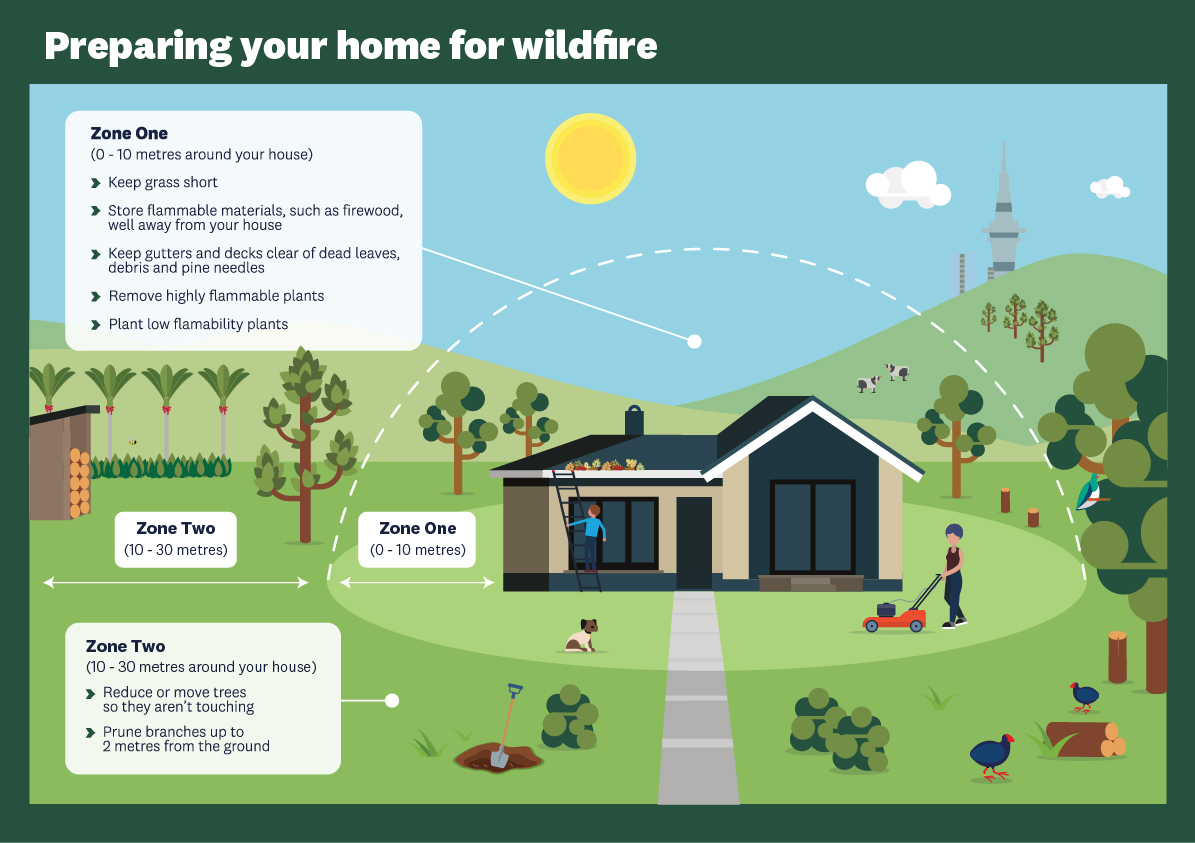
Drought
The lack of water during a drought affects people and their livelihoods. Watercare’s website has information about what the different stages of water restrictions during droughts mean for you, which you can find here.
- Prepare your home and business to cope with droughts by installing rainwater tanks (rainwater tank size calculator available here) and planting drought-resistant plants in your garden, which don’t need watering as often. For garden tips visit our friends at Botanic Gardens.
- Install efficient showers and use the half flush on toilets to reduce water usage. You can save water by having shorter showers too – remind your family that it’s a four-minute limit (you can even set a timer!).
- If you’re on tank water supply, you can get your tanks topped up early if it’s forecast to be a dry season ahead.
- It’s also a good idea to install a rainwater tank even if your property is on mains water supply, to have a backup source of water in case of restrictions for use in the home or garden.
- The lack of water during a drought can also impact pets and farm animals. Ensure you include the needs of your pets in your water calculations, and if you have farm animals, you can find specific information here.
Heatwave
- Listen to local news and weather reports for heat alerts / or hot days (over 25°C).
- Finding ways to cool down before the heatwave starts.
- Install air conditioners and fans to keep your home cool.
- Find out about places where you can cool off, such as public libraries, shopping centres, community centres.
- Discuss heat safety with your family. Prepare a plan for all the places where you spend time - home, work and school - and be prepared for possible power cuts.
- Take a first aid course to learn how to treat heatstroke or exhaustion.
- Make sure you know who is most at risk in your neighbourhood, such as the elderly, children and people who are ill or need extra help.
- To stay safe in the sun have a look at SunSmart.
During a natural hazard event
- Call 111 if there is a risk to life or property.
- During or before an event you can find information from Auckland Emergency Management here.
- Ensure you keep up to date with the latest information, either online or via radio or TV and follow any instructions issued by emergency services including evacuation orders – this could be life-saving advice. This advice may also come in the form of an emergency alert to your mobile phone.
- Check that family, friends and neighbours are aware of any urgent advice, if it is safe to do so.
- Know what to do for each type of natural hazard event:
Flood
- Never drive, swim, or play in or near floodwaters. There are hidden hazards such as debris, strong currents that can sweep you off your feet or the floodwater may be contaminated.
- Find out more on the Auckland Emergency Management website here.
Coastal inundation, erosion and land instability
- Stay away from coastal sites during strong winds or storms.
- Be prepared to evacuate if your home or building is located in a low-lying coastal position and take your grab bag and pets with you if possible.
- Move out of the path of the landslip or eroding coastline – move as early as possible. Evacuate your home or building if it is in danger and take your grab bag and pets with you if you can do so quickly.
Severe weather and storms
- Stay inside with your family and bring your pets inside. Stay away from doors and windows, shelter further inside as necessary.
- Draw the blinds and curtains over windows to prevent glass being dispersed inside in the event of a breakage and close all interior doors. Remain on lower floors but above the basement.
- If you are away from home and there is no building in sight, take shelter in a vehicle and keep the windows closed.
- Watch out for flying debris. Use your arms to protect your head and neck. Watch out for fallen power lines or broken gas lines and stay out of damaged areas.
Wildfire
- Wildfires can start quickly and threaten lives and homes within minutes. Have a plan to ensure you and your whānau know what to do in a fire and how to get out safely and have an agreed meeting place.
- Dial 111 immediately if there’s a fire.
- Get down, Get low, Get out.
- Know your neighbours and talk to your community about what you’ll do in the case of a fire or emergency, and make sure you look after people who may not be able to look after themselves.
- Leaving early is always your safest option and make sure you know how to get away and where you’ll go.
- If you have evacuated, don’t return home until you’re advised that it’s safe.
Drought
- Use water efficiently and adhere to water restrictions. Consider saving water around your home and find tips for that here.
- Check hoses, taps, pipes, and fittings to ensure there are no leaks. Talk to Rural Support Trusts 0800 RURAL HELP (0800 787 254) if you need advice and support in a rural area.
Heatwave
The best way to protect yourself and your family in case of a heatwave is to follow these steps:
- Stay hydrated and cool – drink water, use electric or handheld fans, close curtains at home in rooms where they face the sun. You can even have a cold shower to cool off quickly, or a swim. Limit physical activity – leave physical activity to the coolest parts of the day when possible (morning and evening) and exercise in an air-conditioned space if possible (e.g. your local gym).
- Adjust work practices - if your job is a physical one in a hot area, ensure you are well-hydrated, in shade when possible, and seek medical attention if you feel unwell and inform managers of any health and safety concerns.
- Identify areas close to your home where you can cool off in case your house doesn't have a cooling system and becomes too hot (shaded parks, local waterways, or even in your own shaded backyard etc.) Local shopping malls or other local facilities can also be cool places to spend time during the day.
- Check in with your neighbours, friends, and those at risk and offer your home as a place to come, if you have a good cooling system.
- Ensure your animals have plenty of clean water to drink.
- Don’t walk dogs during the hottest part of the day and check the pavement before you walk by holding the back of your hand on the pavement. If it’s too hot for your hand, it’s too hot for your dog’s paws. You can find some good information on keeping dogs safe in summer at the SPCA.
- During a heatwave, you should be prepared for power outages, due to the increased pressure on the power grid (e.g. from air conditioning) and transport disruptions (e.g. due to train tracks overheating).
After a natural hazard event
- After a natural hazard event, make sure you, your family and your pets are safe, help others if you can, check in on your friends and neighbours, continue to listen to the radio and follow instructions from emergency services.
- Only return home if it is safe to do so.
- Report flooding, slips and any other damage to Auckland Council on 09 301 0101.
- Floodwater may be contaminated so carefully throw away any food and drink that may have been in contact with floodwater including canned goods.
- Report any downed power lines to Vector on 0508 VECTOR (0508 832 867).
- Contact your insurance company as soon as possible if damage has occurred.
- Take photos of any damages for insurance/council.
- Don't throw away any items until your insurance companies says it's ok.
- Check in with your community and offer help if it’s safe and you are able to do so.

